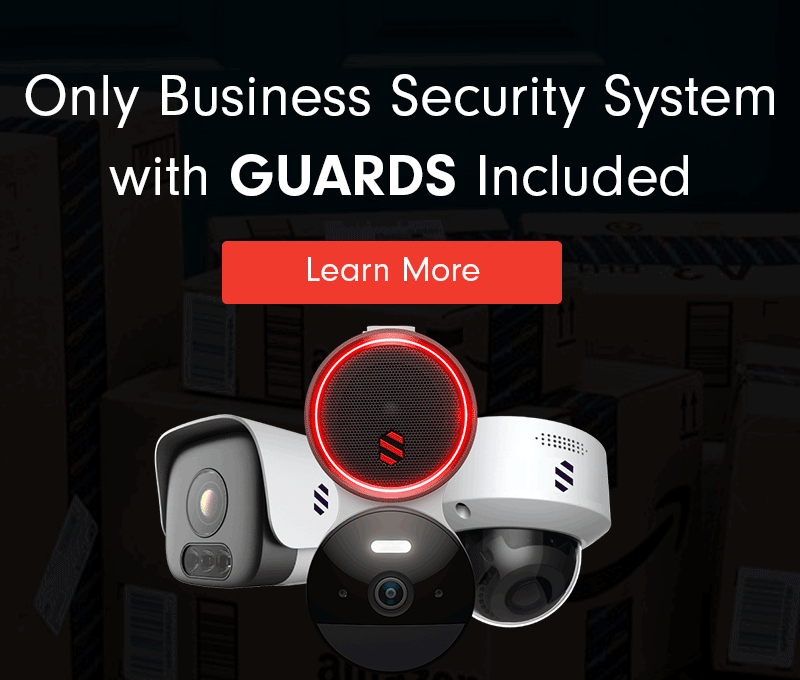Big Ideas for Small Business Security

Running a business is hard work. Running a small business is even harder, as you often don’t have the staff or budget to delegate. In fact, 80% of American small businesses don’t have any employees at all. As a result, you become a jack- or jill-of-all-trades out of necessity, juggling all sorts of tasks. Inevitably, you’re bound to drop something. But one “ball” you can’t afford to drop is security. If your small business security is lacking, it can jeopardize other areas: profitability, efficiency, productivity, and more, perhaps even the continued existence of your business itself.
Many small business owners believe they’re safe because of their size. They incorrectly think they’re not on the radar of nefarious individuals because there are bigger, more lucrative targets out there. But it’s that attitude that makes them so appealing to would-be thieves and other criminals. A major retailer has robust security in place. But the small shop on the corner? Not necessarily so.
Prove them wrong with these small business security tips.
The American Small Business Landscape
Small businesses are truly the backbone of the United States. Consider:
- 99.9% of American businesses are small businesses
- Almost half of American employees—46.4% or 61.7 million people—work for a small business
- Of the 33.2 million small businesses across the country, roughly 81.6% have no employees, 16.3% have 1-19 employees, and 2.1% have 20-499 employees (the Small Business Administration defines a small business as having fewer than 500 workers)
- According to the Bureau of Labor Statistics, 20% of small businesses fail in their first year, and almost 50% fail within five years
- In the past 25 years, small businesses have created 12.9 million jobs, compared to only 6.7 million by large businesses
- California has more small businesses than any other state, followed by Texas, Florida, New York, and Illinois
- Roughly 625,000 small businesses open each year
When a no-employee business makes an average of only $44,000/year, a single security incident—theft, break-in, data breach, etc—can financially cripple it. Management and money issues are the top reasons why small businesses fail.
In other words, proper security can literally make or break you.
Small Business Security Statistics
But is it really that necessary? You bet it is. Threats abound from within, without, and online. Consider:
- Regardless of industry, 37% of small businesses have experienced theft in the past 12 months, with 14% experiencing it monthly or more frequently. Just over one-third have witnessed more theft this year than last year.
- 43% of all cybercrime specifically targets small businesses, but 54% believe themselves “too small” to target. And 60% of small business cybercrime victims close within six months.
- 95% of businesses have experienced employee theft, which is slightly more prevalent with small businesses than larger ones.
- Of the 2.5 million cases of reported burglaries each year, 34% involve small businesses.
- One survey found that the average out-of-pocket cost for a small business after a burglary or theft was $8,000.
The impact on small businesses is financial, psychological, and emotional. Take Rains PDX, a clothing retailer in Portland. It was forced to close forever after suffering 15 break-ins over an 18-month period. Or consider Ana Fernandez, who had to close her restaurant Chamoy City Limits after eight crime incidents in just eight months. There are hundreds, if not thousands, of stories like those.
So what’s a small business owner with a limited budget and few resources to do? You start small.
Conduct a Small Business Security Check
One of the easiest things you can do is conduct a simple security check. An audit will give you a clear idea of where you currently stand. And while most cities will have security providers willing to do it for you, it’s possible to do it yourself and save some money. In fact, there are plenty of free or low-cost templates available online.
At its simplest, a security audit gathers information into one convenient location and allows you to prepare for risks, both perceived and real. Dealing with a security incident is much easier when you have a plan in place before it happens. Otherwise, you’re left scrambling.
You can think of security audits as either routine—conducted on a regular schedule to identify emerging issues—or event-based, which is in response to a specific security incident.
To conduct your own audit, follow these steps:
- Determine your assets. These include electronics, internal documentation, confidential data, intellectual property, and anything else of value. Make copies. Back up data. Write down serial numbers. Take photos.
- Identify threats and risks. Consider the big picture and individual threats to each asset.
- Review your existing security. What are you currently doing to keep your assets safe? This should include physical solutions like locks, online practices like firewalls, and safety and security procedures.
- Prioritize your threats. Determine a basic risk score for each threat by considering the potential damage from a security event, the likelihood, and your current ability to deal with it. The higher the first two—and the lower the latter—the higher priority that risk should be.
- Create your responses. What will happen in the immediate aftermath? How will you respond? What information will you need to assist with the fallout?
An ounce of prevention is worth a pound of cure.
Crime Prevention Through Environmental Design
Another DIY solution is crime prevention through environmental design. CPTED is a philosophy that encourages deliberate design choices to discourage criminal behavior before it happens. At its core, CPTED uses elements like sightlines, lighting, and community to increase the risk for would-be thieves and other criminals. Its five pillars are:
Natural surveillance, for example, would include leaving a light on so passersby could see someone rifling through your store after hours. Maintenance might be removing trash and graffiti immediately so your business looks cared for and protected.
CPTED helps you send a message to burglars without saying a word.
Implement Strict Access Control
Businesses aren’t immune from the millions of break-ins across the country each year. As a result, access control is central to strong security. Strictly control and monitor access to your premises, your inventory, your data, and anything else of value. And remember: theft doesn’t exclusively come from outsiders. If you have employees, you must institute access controls to prevent internal theft. Give free access only to a trusted few.
Require employees to lock windows and doors after operating hours. Sensors are an affordable upgrade that can you can install yourself in minutes. Anyone opening a door or window without disarming the system triggers an immediate alarm.
Upgrade locks to the best you can afford. Choose a smart lock if you’re able. These remove the need for physical keys, enable remote access, and can keep a record of comings and goings. Make sure to change the passcode routinely and after incidents or staff changes. You can also secure your door from being kicked in with simple devices like jammers and wedges.
Windows are a popular illegal point of entry. Burglars can easily smash or cut the glass and break flimsy locks. Combat this vulnerability with pin locks for windows that open up, hinged wedge locks for windows that open from the top or bottom, or a wooden dowel for those that slide open. There is a wide variety of window locks available for every type of window. You can also reinforce glass with a variety of methods, ranging from security film to nearly unbreakable Riot Glass. Finally, you might want window security bars depending on your location and risk level.
And don’t forget about access control within your premises. Inventory and confidential data should be behind locked doors, cabinets, and passwords. Anchor expensive electronics or equipment in place if possible.
Small Business Security Cameras
Business security cameras are game-changers. Their presence alone can be a deterrent. Want proof? Surveys of convicted burglars revealed that the majority would leave if they saw one. A study in South Korea found a 47% reduction in crime when cameras were visible. And another study found that brick-and-mortar businesses with security cameras installed are 33% less likely to experience crime onsite compared to those without cameras.
The security camera benefits for businesses are many. That much is clear.
But what types of security cameras are best for small businesses? There are many options: indoor vs. outdoor, wired vs. wireless, CCTV vs. IP, DIY vs. professionally installed, and so on. Ultimately, you know your business and its needs best. A quick consultation with a security expert can translate those needs into solutions and show you the right devices for your property. (For a free consultation, contact Deep Sentinel at 833.983.6006.)
Any camera is better than no camera, but there are a few specs and features you should prioritize:
- Generally, you’ll want a security camera resolution of at least 1080p, night vision, and the ability to record.
- To save on storage and power, consider a camera with smart motion detection. That way, it’ll only record when it detects movement.
- A camera with 2-way audio allows you or your security provider to engage with the suspect live.
- Seriously consider engaging a monitoring service. Cameras are helpful after an incident, but if no one is watching, they can’t do much before or during. There are unmonitored and monitored cameras, but not all monitoring is created equal. Passive monitoring reacts to an event or alarm. Active monitoring prevents the problem by taking action in real time.
Consider your options and select the best camera and plan that fits your budget and needs.
Deep Sentinel Small Business Security Cameras in Action
Deep Sentinel offers unparalleled business security at an affordable price. The difference? High-tech HD cameras, artificial intelligence, and active monitoring.
These are the only business security cameras with live guards included behind every camera.
How does it work? Deep Sentinel’s wireless security cameras and PoE camera systems include features like motion detectors, floodlights, night vision, and high-decibel sirens to scare away would-be burglars. First, the cameras detect any movement. Next, AI dismisses non-threats like a dog or passing car but notifies the guards of suspicious behavior within seconds. Then, the LiveSentinel surveillance guards evaluate and engage with suspects live via 2-way audio. And if that’s not enough, the guards can notify the police of a verified crime in progress.
All of that, from start to finish, takes 30 seconds or less. No other alarm or camera provider even comes close. And Deep Sentinel comes at a fraction of the cost of hiring security guards to patrol your property.
So what’s the best security solution for small businesses? Deep Sentinel. It’s a premium product that’s small business friendly.
Need a Solution that Prevents Crime?
Deep Sentinel is the only security technology that delivers the experience of a personal guard on every customer’s home and business. Visit deepsentinel.com, call 833-983-6006, or request a free security consultation below:

